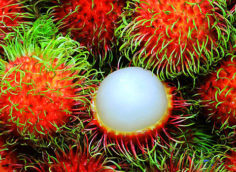Some people who don't eat meat do it for religious reasons. No problem. But most do it because they think it's healthier, more ethical, or better for the environment. They're wrong. Here are 10 meatless myths that need to die:
For the last 50 years, a good chunk of the population has been swayed towards vegetarianism because of the alleged association between saturated fat and heart disease.
Although many of us now understand that the original research was based on data from the fraud, Ancel Keys, and a number of meta-analysis' have demonstrated that there's no reliable evidence to support the association, some folks still haven't gotten the memo.
A 2009 review in the American Journal of Clinical Nutrition analyzed research from 21 studies with saturated fat intake from 350,000 people and found no association with heart disease.
Similarly, vegetarians believe there's value in a meatless diet because it's low in cholesterol. But we've known since 1937 that dietary cholesterol has very little effect on blood cholesterol.
Part of the problem is that most of us are unwilling to accept this information. We've always believed saturated fat and dietary cholesterol cause heart disease, so why would we believe otherwise?
One of the reasons red meat has been unfairly demonized is because there's a tendency to group it together with processed meat. Meanwhile, any evidence linking red meat to an increase in heart disease, cancer, or mortality, finds no association with the unprocessed variety. Same goes for fat.
A 2004 study from the Harvard School of Public Health studied fat intake on the progression of atherosclerosis (heart disease), and found that the group eating the most polyunsaturated oils (found in abundance in nuts, seeds, and vegetable oils) had the worst outcome, and the group eating the highest amount of saturated fat (found in beef, butter, and animal fats) reversed the atherosclerosis.
Not surprisingly, it's a similar story with fat type and cancer. Lineolic acid is the dominant polyunsaturated fat in vegetable oil, and various studies have linked its consumption to tumor growth. While the lineolic acid found in the fat of animals, conjugated lineolic acid (CLA), has proven effective in preventing cancer.
Many vegetarians refer to it as the "China Study." Might as well call it The Vegetarian Manifesto, because those avoiding meat can't stop quoting it.
For the China Study, Dr. T. Colin Campbell used observational data from 65 counties in China to try and prove that animal products increase cancer and heart disease. Aside from overwhelming the average reader with its size and citations, it's easy to want to believe the information in this book.
But Campbell conveniently forgets to mention positive associations between high protein intake and low cancer rates, and low protein intake and high cancer rates. For instance:
The people of Tuoli consume 45% of their diet from fat, eat roughly 135 grams of animal protein, and have lower heart disease and cancer than the vegan countries emphasized throughout the book.
The people of Longxian consume the lowest amount of animal foods, but have the second highest death rate from heart disease. Furthermore, the book fails to include associations between other processed foods and their significant correlation with heart disease and cancer.
The data actually show:
- A seven-times greater cancer association with a high-carb/high-sugar diet
- Fewer cancer deaths with a high animal-fat intake
This strangely lead him to conclude, "People who ate the most animal-based foods got the most chronic disease." Huh?

Here's another classic go-to argument of vegetarians: "Cancer grows in an acidic environment and meat is veeeery acidic." (Takes bite of bagel and sip of white chocolate mocha soy latte.) "An alkaline diet prevents cancer growth, and can even remove cancer cells."
The speculation that there's an association between the pH (the degree in acidity) of our diet and cancer would depend on the foods we eat changing the pH of our blood and extracellular fluid... which is impossible!
The pH level of the food you're eating can alter the acid or alkaline measure of your urine, but can't adjust the pH of your blood.
Furthermore, cancer cells can grow in any environment, not just an acidic one, with most experiments showing growth at normal pH (7.4). This means it's not the pH of the blood that promotes the cancer; it's the cancer that promotes the acidic blood.
Most importantly, even if an alkaline diet has produced impressive associations with better health and longevity, there's no reason why a meat-eater can't consume ample amounts of fruits and vegetables and enjoy the same benefits. Vegetarians aren't the only ones who eat vegetables and fruit. Meat eaters have them too.
In fact, when you look at the dietary habits of our hunter-gatherer, meat-eating ancestors, you'll notice they were able to maintain a net alkaline diet, while most were getting upwards of 50% of their total calories from animal products.
Therefore, even if an acidic diet were a problem (which it isn't), there's no reason to restrict animal protein. Not only can meat-eaters consume as many alkaline-forming foods as vegetarians, but by eliminating grains, beans and sugar, which are also acidic, they can more than likely achieve a less-acidic one.
It's also common for vegetarians to cite the Seventh Day Adventists as an example of low cancer and mortality rates from avoiding meat. But it's unfair to compare them to a meat-eater in regular society. They are a secluded group that doesn't smoke or drink, and doesn't engage in other life-shortening lifestyle decisions.
This "healthy-user bias" tends to be common when looking at vegetarians, and it's very misleading to the general public. For example, a meat-eating equivalent to the Seventh Day Adventists would be Mormons, who follow similar principles with respect to smoking, drinking, and other unfavorable lifestyle choices. Their cancer and mortality rates compared to the U.S. average?
- 22% Lower Cancer Rate
- 34% Lower Mortality Rate from Colon Cancer
Also worth noting, despite the Seventh Day Adventists' low rate of colorectal cancer, they seem to be at a higher risk of other cancers – Hodgkin's disease, malignant melanoma, brain, skin, uterine, prostate, endometrial, cervical, and ovarian cancer.
Perhaps related to their lack of animal fat? Or maybe because of their overconsumption of soy-derived alternatives?
Either way, there's no reliable proof that vegetarians live any longer or bypass more disease than meat-eaters, and an equal amount of opposing evidence. For instance, research from 1973 in the American Journal of Epidemiology found higher all-cause mortality rates in both vegetarian men (0.93%) and women (0.86%) compared to their non-vegetarian counterparts (men 0.89%, women 0.54%).

Since protein can be scarce for those avoiding meat, soy is the vegetarian answer to a diet lacking muscle-building amino acids. It's also peddled as the cholesterol lowering replacement for the supposed artery-clogging and cancer-causing features of red meat.
We've not only been told that animal protein and saturated fat are bad, but we've been creatively convinced that plant proteins, like soy, are the solution. Many are surprised to learn that the soybean itself is toxic to humans and livestock.
It's one of the most heavily sprayed crops, and close to 93% of it is genetically modified if that's something that concerns you. Soy also contains isoflavones that mimic estrogen in the body (phytoestrogen), bind to estrogen receptor sites, and cause a host of health problems:
Hazards of Soy
- Inhibits reproductive health
- Alters brain function negatively
- Suppresses thyroid hormone
- Disrupts the endocrine system
- Increases potential for breast and prostate cancer
Maybe this is why a study from the Journal of the American College of Nutrition found cognitive dysfunction and brain atrophy in men consuming two or more servings of tofu per week.
Researchers in the American Journal of Clinical Nutrition also found significant cell proliferation in breast tissue from soy supplementation in only 14 days. And a Japanese study at the Ishizuki Clinic found that just 35mg of isoflavones per day caused thyroid suppression in healthy individuals in just three months.
Sadly, most of the positive information we hear about soy is from companies marketing soy, or the governments controlled by them. It should never be treated as a meat or milk replacement, and selling it as an infant formula should be illegal.
In 1992, the Swiss Health Service estimated that two cups of soy milk per day provides the estrogenic equivalent of one birth control pill... and infants fed soy formula the equivalent of five birth control pills.
And even if we look strictly at performance, soy protein has been shown to decrease muscular strength, lower testosterone and increase cortisol when consumed post-workout. The exact opposite of what we get from meat and dairy, and the exact opposite of what we need to live a longer, stronger life.
A case study in 1980 compared two prehistoric populations living in the same area but with significantly different nutritional habits:
Agriculturists (Hardin Village; "Farmers")
Hunter-Gatherers (Indian Knoll; "Hunters")
The villagers lived mainly on corn, beans, and squash, and the hunter-gatherers mostly meat, fish, and wild fruit. After researchers analyzed the health of both populations, they found:
Hunters Healthier than Farmers
- Hunters had longer lifespan and lower infant mortality than farmers.
- Farmers had common iron, calcium, and protein deficiencies.
- Hunters had no bone malformations or cavities, whereas farmers averaged seven.
Aside from low muscle and weak bones, the biggest threat to removing meat from the diet is a deficient brain. Considering that cognitive development accelerated with the introduction of meat and fish to the human diet, this shouldn't come as a surprise.
"The incorporation of increasingly greater amounts of animal products into the diet was essential in the development of the large human brain."
— Aiello and Wheeler, Current Anthropology, 1995.
The saturated fat and cholesterol in animal products are absolutely necessary for our bodies to function optimally. For example, breast milk contains high amounts of saturated fats to nourish our ever-increasing brain.
Benefits of Saturated Fats:
- Are preferred fuel source for the heart
- Are genetic regulators that may help prevent cancer
- Used to provide structure to cells of all types (lungs, bone, liver, brain, etc.)
- Required to absorb fat-soluble vitamins (A, D, E, and K) and assimilate calcium
- Act as an antiviral, antimicrobial, and antibacterial agent
Cholesterol is equally beneficial as it helps maintain adequate nutrient levels (vitamin D, sex hormones), protect against oxidation, build cell membranes, and feed and support neurons and their various functions.
The brain support from cholesterol is likely why we see our levels naturally increase with age. And similar to saturated fat, why we see depression, cognitive impairment, degenerative diseases (Alzheimer's) and neurological disorders (Parkinson's) associated with lower levels.
B12 deficiency is also associated with an aging brain. Although unlike saturated fat, it can only be properly obtained from animal sourced foods. According to one study, those with the highest levels of B12 were six-times less likely to have brain shrinkage than those with the lowest.
Moreover, the sea vegetables and tempeh that vegetarians are scarfing down to try and feed their brains is only increasing their need. Hailed vegetarian sources of B12 actually contain high levels of pseudo B12 (cobamide) that block the absorption of true B12.
Research from 2003 in the American Journal of Clinical Nutrition determined that B12 deficiency in vegetarians and vegans is as high as 70-80%. Vegan diets are deficient in the omega-3 fatty acids, which among other things, adds to this decline in cognitive ability.
Meat-free eaters will attempt to tell you otherwise, but plant foods only contain short-chain omega-3's (ALA), which have an extremely weak conversion rate (2-10%) to the long-chain essential fatty acids usable by humans (EPA and DHA). There's some evidence suggesting that attempting to raise blood DHA status with strictly an ALA omega-3 source is nearly impossible.
Interestingly, a lack of saturated fat, iron and zinc also appear to inhibit our ability to convert ALA. So, although vegetarians have been led to believe that their flax seeds and hemp hearts and avoidance of animal foods is providing all the health-promoting benefits they need, they've been fooled.
Compared to omnivores, vegetarians have approximately 30% less EPA and DHA and vegans 50-60% less.
The third highly prominent deficiency for vegetarians to consider is iron. Heme (or ferrous) iron is the best available source for humans and is only absorbed from animal source foods.
Plus, the vegetarian iron source (ferric or non-heme) is easily inhibited by other commonly consumed foods. Research from 1994 in the European Journal of Clinical Nutrition suggesting that the vegetarian diet can reduce iron absorption by more than 85%.
This is largely because many of the foods that vegetarians rely on as a protein staple (grains and legumes) are high in anti-nutrients that bind to minerals and prevent absorption. So even if they were consuming enough of the essentials (which they're not), they're still going to be deficient.
Like animals, plants have an innate desire to survive, produce offspring, and prosper as a species. Unfortunately for plants, they can't jump up and bite us when we try to consume them, but they can bite us later on.
When we try to eat a part of the plant that's not for consumption, we run into harmful toxins designed to damage and discourage us from future snacking. And generally, the more important the part (i.e. the seeds necessary for procreation) the higher the level of defense.
Two of the most common plant defenses, lectins and phytates, are found in large amounts in grains, legumes, nuts and seeds.
Phytase (or phytic acid) has been shown to reduce nutrient absorption, with magnesium, calcium, iron, zinc, and B12 being the most substantial. And lectins have the unique ability to bind to the cells of the gut and produce an inflammatory response. This results in disrupted nutrient uptake and an elevated risk of a more serious gastrointestinal condition.
Though these anti-nutrients don't seem to cause problems in small amounts, the digestive damage becomes increasingly prominent with consistent and excessive consumption. It's worse for those avoiding animal protein, as grains, beans, nuts, and seeds become their sole protein source.
This not only leaves them deficient in essential nutrients because of a lack of animal protein and fat, but the excessive intake of phytates and lectins decreases the nutrient availability in their foods and damages the intestinal lining where nutrients are absorbed.
A vegetarian will tell you that these plant defenses can be removed with proper preparation procedures (sprouting, soaking, and boiling), but research tells us that lectins are resistant to heat, and only 50% of phytates are removed with an 18 hour soak (none are removed from soy).

"Animals are living things. Meat is murder. There's not enough land, water, or resources for the population to consume animal products."
You've heard those lines before. They also tell us, "Grains can feed the world," not realizing that they're destroying more land, using more resources, and killing more animals in the process.
Wheat, corn, and soy are monocrops that increase the rate of soil erosion, decrease the water and nutrient content of the soil, and essentially strip the earth of its ability to reproduce.
Once the soil is destroyed in one area, the crop must occupy a new location (with fertile soil), and significant time and resources are needed to repair the previous spot.
Monocrops are taking over the world while returning nothing to the soil. In fact, 90% of the northern US prairies have already been taken over by monocrops. They inhibit grass growth, which limits animal feed and reduces meat quality, forcing us to feed our animals the same crappy soy, corn, and wheat we're fattening and killing ourselves with.
More importantly, they're driving animals out of their homes to lay down these giant crop fields, and soaking up the water supply in order to keep them irrigated.
The circle of life is supposed to be a give-and-take relationship. We, as humans, can't digest grass and therefore look to the cow to consume grass and convert it into digestible fat and protein. The cow not only provides humans with essential protein and fat, but ensures the health of the grass and soil by grazing and fertilizing.
Crops, on the other hand, are destroying and taking over the land, sucking water reserves dry, and eliminating any potential for regrowth. This drives animals out of their forests and homes to provide nutrient degenerate crops with more land and water.
Ironically, it seems that vegetarians love cows but just hate the millions of rabbits, mice, moles and snakes slaughtered every year to make their soy milk.
Crack open any of the best-selling books on meatless living and you'll quickly notice that the authors assume all animal products are factory farmed, and that eating meat means scarfing down pizzas and cheeseburgers.
Of course your fat friend is going to have great results if he swaps his daily meatball sub for a salad. But that doesn't mean meat is the problem. And of course hormone-injected, grain-fed cattle aren't always healthy, but that doesn't mean we can't choose or produce a higher quality, non-toxic product.
The same can't be said for vegetarians. By eliminating animal products, they fail to nourish their body with the vitamins, minerals, essential fats and proteins they need to prosper. And as they continue to look to beans, grains, nuts and seeds to fill the gaps, their deficiency only grows in significance.
Non-meat eaters become deficient in their consumption of essential nutrients and deficient in their absorption of essential nutrients.
Vegetarians eliminate the most nutrient-dense foods on the planet with no ability to make up for those nutrients elsewhere, leading to malnourishment underdevelopment, poor immunity, and anemia in their younger years, which then becomes infertility, osteoporosis, sarcopenia, and Alzheimer's as they age.
Although you may know of an individual that appears to prosper on a meatless diet, there are also guys that win Olympic Gold Medals and World's Strongest Man Titles eating McDonalds.
Some people may perform well without animal products, but they'd perform better if they included them – in large amounts like their predecessors.
Animal sources are critical to our long-term health and should be recommended, not avoided or replaced.
- Micha R et al. Red and processed meat consumption and risk of incident coronary heart disease, stroke, and diabetes mellitus: a systematic review and meta-analysis. Circulation. 2010 Jun 1;121(21):2271-83. PubMed.
- Rohrmann S et al. Meat consumption and mortality–results from the European Prospective Investigation into Cancer and Nutrition. BMC Med. 2013;11:63. PubMed.
- Ascherio A .et al.Health effects of trans fatty acids. Am J Clin Nutr. 1997 Oct;66(4 Suppl):1006S-1010S. PubMed.
- Lock AL et al. Trans Fatty Acids in Ruminant-derived Foods: Fact and Fiction. January 2008. ansci.cornell.edu.
- Wolk A et al. A Prospective Study of Association of Monounsaturated Fat and Other Types of Fat With Risk of Breast Cancer. Arch Intern Med. 1998 Jan 12;158(1):41-5. PubMed.
- Robey IF. Examining the relationship between diet-induced acidosis and cancer. Nutr Metab (Lond). 2012;9:72. PMC.
- Gassman B. Soybeans: Chemistry and Technology, Bd. I: Proteins. Molecular Nutrition & Food Research. 1973 Jan;17(8):865-866. onlinelibrary.wiley.com.
- Acreage. usda.mannlib.cornell.edu.
- Turner JV et al. Molecular aspects of phytoestrogen selective binding at estrogen receptors. J Pharm Sci. 2007 Aug;96(8):1879-85. PubMed.
- Dawson PL et al. Effect of lauric acid and nisin-impregnated soy-based films on the growth of Listeria monocytogenes on turkey bologna. Poult Sci. 2002 May;81(5):721-6. PubMed.
- Elias PK et al. Serum cholesterol and cognitive performance in the Framingham Heart Study. Psychosom Med. Jan-Feb 2005;67(1):24-30. PubMed.
- Freed DLJ. Lectins in Food: Their Importance in Health and Disease. Journal of Nutritional & Environmental Medicine 1991 Jan;2(1):45-64.
- Domínguez-Rodrigo M et al. Earliest Porotic Hyperostosis on a 1.5-Million-Year-Old Hominin, Olduvai Gorge, Tanzania. Plos One. 2012 Oct;7(10):e46414.
- Aiello L. The expensive-tissue hypothesis: the brain and the digestive system in human and primate evolution. Current Anthropology. 1995;36(2):199-221.





